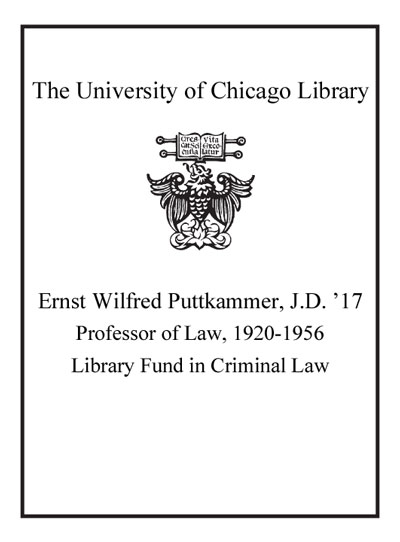The ends of harm : the moral foundations of criminal law /
Saved in:
| Author / Creator: | Tadros, Victor. |
|---|---|
| Imprint: | New York : Oxford University Press, 2011. |
| Description: | xii, 370 p. ; 24 cm. |
| Language: | English |
| Series: | Oxford legal philosophy Oxford legal philosophy. |
| Subject: | |
| Format: | Print Book |
| URL for this record: | http://pi.lib.uchicago.edu/1001/cat/bib/8649686 |
Table of Contents:
- 1. Introduction
- I. The Problem of Punishment
- II. Philosophical Method
- III. An Outline of the Book
- Part I. The Aims of Punishment
- 2. Justifying Punishment
- I. Intrinsic and Instrumental Value
- II. What is Retributivism?
- III. The Costs and Benefits of Punishment
- IV. Consequentialism and Non-Consequentialism
- V. The Immediate and the Deep Justifications of Punishment
- Conclusions
- 3. Recognition and Choice
- I. How Should Wrongdoers Feel?
- II. Duty and Choice
- Conclusions
- 4. Against Desert
- I. Free Will and Desert
- II. The Desert Basis
- III. Why Suffering Isn't Good
- IV. Desert and State Punishment
- V. Rights-Based Retributivism?
- Conclusions
- 5. The Limits of Communication
- I. The Aims of Communication
- II. From Communication to Punishment
- Conclusions
- Part II. Means, Motivations, and Ends
- 6. Defending the Means Principle
- I. Some Answers to the Trolley Problem
- II. The Limited Power of the Doctrine of Acts and Omissions
- III. Means and Status
- IV. The Limits of the Means Principle
- Conclusions
- 7. Wrongdoing and Motivation
- I. The Priority of Facts?
- II. Means and Motivations
- III. Means Without Motives
- IV. How Intentions are Relevant to Permissibility
- V. Should We Always Prevent Wrongdoing?
- VI. Motivation and the Structure of Wrongdoing
- Conclusions
- Part III. Permissibility, Harm, and Self-Defence
- 8. Choice, Responsibility, and Permissible Harm
- Introduction
- I. Choice and Self-Defence
- II. Choice and Proportionality
- III. Causation, Entitlements, and Liabilities
- IV. Causation and Permissibility
- Conclusions
- 9. Conflicts and Permissibility
- Introduction
- I. Isolating the Problem
- II. Why We Should (Typically) Reject Conflicts
- III. Acts, Omissions, and Agent Relativity
- IV. The Value of Conflicts
- Conclusions
- 10. Mistakes and Self-Defence
- I. Facts, Evidence, and Beliefs
- II. Averting Evidence-Relative Permissible Threats
- III. Averting Fact-Relative Permissible Threats
- Conclusion
- 11. Responsibility and Self-Defence
- I. Eliminative and Manipulative Harm
- II. Eliminating and Diverting
- III. Pre-Efforts and Post-Efforts
- IV. Responsibility and the Duty to Rescue
- V. Unblocking
- Conclusions
- Part IV. Punishment and the Duties of Offenders
- 12. Punishment and Duty
- Introduction
- I. Elimination and Manipulation
- II. Responsibility and Harm
- III. Responsibility and the Duty to Protect
- IV. Punishment as Remedy for Breach
- V. Beyond Rectification
- Conclusions
- 13. State Punishment
- I. The Right of the State to Punish
- II. The Duty of the State to Punish
- III. The Exclusive Right of the State to Punish
- IV. Punishment and Organ Distribution
- Conclusions
- 14. Protection Against Punishment
- I. Consequentialist Approaches
- II. The Rule of Law
- III. Criminal Responsibility
- IV. Criminalization
- V. Procedural Protections
- Conclusions
- 15. Proportionate Punishment
- I. Two Conceptions of Proportionality
- II. The Subject Matter of Proportionality
- III. The Comparative Value of Punishment
- IV. The Punishment Cap
- V. Which Consequences are Relevant?
- VI. Rehabilitation and Paternalism
- VII. Is the Harm We Impose on Family Members Proportionate?
- Conclusions
- Bibliography
- Subject Index
- Index of Names
- Index of (Mostly Hypothetical) Cases

